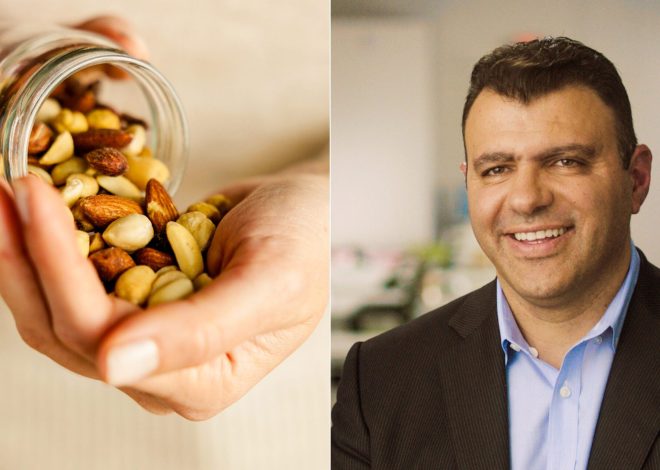
Nutrition: What role does the time of day play when eating? | Guide | We in Bavaria | BR Television | Television

It was previously assumed that the time of day had no influence on metabolism and that it therefore made no difference when a calorie was consumed during the day.
However, surveys of overweight subjects showed that weight control throughout the day was more larger breakfast easier and the feeling of fullness lasts longer throughout the day. Studies have also shown that the Blood sugar levels after a late meal increases significantly more than in the morning. The scientific conclusion: Human energy metabolism is generally higher in the morning than in the evening and the body can metabolize carbohydrates better in the morning. However, the Total calories of the day!
Read here how useful a nutrition plan is.
How does our “internal clock” influence our metabolism?
Our “internal clock” determines metabolic processes such as fat absorption in the intestine, but also cognitive performance.
Basically, there are two so-called chronotypes: the “Larks” and the “Owls”:
- Larks have energy in the morning and go to bed earlier.
- Owls stay awake longer and are more sluggish early in the day. They skip breakfast more often and consume more fast food. The result: an increased risk of cardiovascular disease, malnutrition, obesity and type 2 diabetes. Tip: This group of people should endeavour to at least Small snack for breakfastto prevent future cravings.
Raw food only until 2 p.m. – is that true?
There is no conclusive scientific evidence that raw food and fruit are not digested properly in the evening. The tolerance of raw food consumed before going to bed varies from person to person.
However, people who have heartburn have to fight, Avoid raw food in the evening. Fruit contains a lot of fruit acid, which can lead to burping. This can be particularly unpleasant when lying down and can make it difficult to fall asleep. (When sitting or standing, gravity can prevent stomach acid from rising.)
Everything you eat after 6 p.m. remains undigested – is that true?
That is not true! Digestion begins in the mouth with the Chew and with the help of the saliva The gastrointestinal tract continues to work at night, but less actively.
Good to know:
It is best to take the last meal three hours before bedtime a.
What should sensitive people pay particular attention to at dinner?
People with a sensitive stomach should pay attention to the following points in the evening:
- Avoid in the evening highly seasoned, very fatty/fried foods and high-calorie Food because it stays in the gastrointestinal tract longer and is digested more slowly.
- Avoid in the evening alcoholbecause it slows down digestion.
- Avoid eating dinner if possible carbohydrates like white bread and sweets.
- Eat only small evening mealsas it counteracts stomach pressure, feeling of fullness and heartburn.
- Eat in the evening if possible liquid meals such as soups and porridge, as these stay in the stomach for a shorter time and are generally more digestible.
- Eat in peace and chew well.
- Pay attention after dinner on light movement and take an evening walk, for example.
Good to know:
It is a myth that High proof after a meal helps digestion! alcohol relaxes the stomach muscles and therefore has a pleasant effect, but it delays digestion. The stomach muscles are inhibited and the food pulp stays in the stomach longer.
Is intermittent fasting the solution?
Intermittent fasting usually means that you are only allowed to drink for 16 hours and then eat normally for the remaining 8 hours.
The Advantage is that this form of food intake prevents very frequent snacking.
The Disadvantage However, there is no change in diet in the sense of more sensible food selection and preparation.
Does food combining make sense?
A food combining diet makes no sense! The assumption that carbohydrates and Proteins cannot be digested at the same time has long been scientifically disproven. The two nutrients do not interfere with each other’s digestion. Furthermore, almost all foods contain both carbohydrates and protein. In the long term, this type of diet would lead to nutritional deficiencies.
How long should the breaks between meals be?
For most people, between meals, a Interval of 3-5 hours ideal.
On the one hand, this prevents blood sugar levels from dropping too low and leading to cravings, and on the other hand, it prevents uncontrolled snacking. This is often associated with less healthy foods and can lead to obesity in the long term.
How many meals should we eat a day?
For Adult can three main meals (breakfast, lunch and dinner) should be sufficient. However, it should not be less. Children Due to their active metabolism and comparatively small stomach, five meals (three main meals + two snacks).
Should we just eat when we are hungry or should we only eat at set times?
In principle, hunger is something natural. In the stomach lining and pancreas, the Hunger hormone ghrelin formed and stimulates the appetite Hunger signals that the body energy required. The Feeling of satiety usually occurs after about 20 minutes a.
Eating when you’re hungry has the advantage of training your self-awareness. But it also has the disadvantage that your blood sugar level can be very low. This puts you at risk of overeating. This is dangerous for diabetics.
At fixed times to eat has the Advantagethat extreme hunger and thus very low blood sugar levels are prevented. It can also bring organizational advantages and be an important part of family life (exchange, conversations).
But it also has a Disadvantage: You may eat without feeling hungry. This unnecessary energy intake can lead to weight gain. In addition, your self-awareness of hunger and satiety takes a back seat.
Conclusion
“In principle, we do not need fixed times to cover our energy needs. The natural feeling of hunger reminds us to eat. Relying on the feeling of hunger alone carries the risk of cravings and uncontrolled food intake, especially with unreasonable foods and dishes. Eating at fixed times structures the day and is the more practical option for organizational reasons, especially for families/several people in one household. There should be breaks of three to five hours between meals.”
Jutta Löbert, nutrition expert
Jutta Löbert and “Wir in Bayern” wish you much success with the tips!

Ethel Purdy – Medical Blogger & Pharmacist
Bridging the world of wellness and science, Ethel Purdy is a professional voice in healthcare with a passion for sharing knowledge. At 36, she stands at the confluence of medical expertise and the written word, holding a pharmacy degree acquired under the rigorous education systems of Germany and Estonia.
Her pursuit of medicine was fueled by a desire to understand the intricacies of human health and to contribute to the community’s understanding of it. Transitioning seamlessly into the realm of blogging, Ethel has found a platform to demystify complex medical concepts for the everyday reader.
Ethel’s commitment to the world of medicine extends beyond her professional life into a personal commitment to health and wellness. Her hobbies reflect this dedication, often involving research on the latest medical advances, participating in wellness communities, and exploring the vast and varied dimensions of health.
Join Ethel as she distills her pharmaceutical knowledge into accessible wisdom, fostering an environment where science meets lifestyle and everyone is invited to learn. Whether you’re looking for insights into the latest health trends or trustworthy medical advice, Ethel’s blog is your gateway to the nexus of healthcare and daily living.



